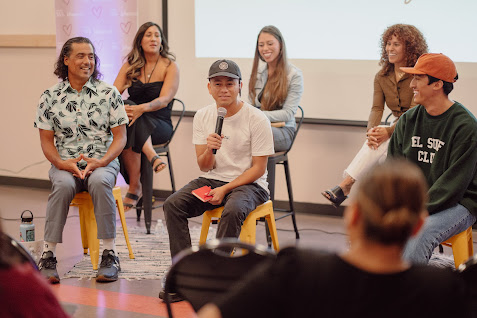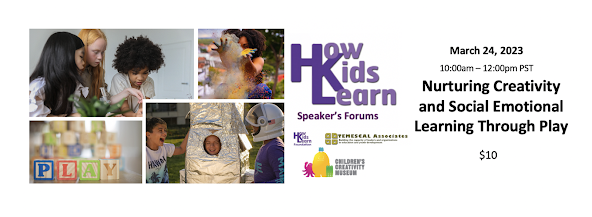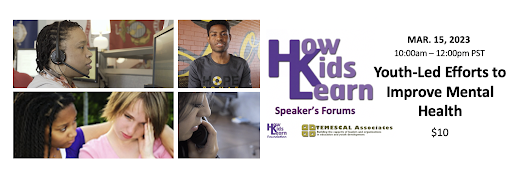 |
| Source: Simply Wholehearted |
By Sam Piha
Meet Axel Perez. He has been a youth leader and activist since he was 15 years old. He is now 20 and Co-Founder/ President of Simply Wholehearted. Axel recently participated in a How Kids Learn Foundation webinar entitled “Promoting Kindness in Afterschool Programs” and will be featured in a future webinar on March 15, 2023 entitled, “Youth Led Efforts to Improve Mental Health.”
We interviewed Axel Perez about his non-profit, kindness and youth mental health and below are his responses.
Q: Briefly, what is your story? How did you start?
A: The idea of Simply Wholehearted was present way before it became the organization it is now. In my sophomore year of high school, at the age of fifteen, I started a podcast named “This Teenage Life,” where I discussed real-life issues teens experience as young adults. When I realized I wasn’t going to be a teen forever, I changed the route of my podcast, rebranded to “Simply Axel” and began talking about societal issues, like the separation of families at our borders. Running the podcast with this type of content, I didn’t feel as passionate as I wanted to be. At this point in my life, I had served my fourth year on Student Council (ASB) as Student Body President, Southern Regional Director for the California Association of Student Leaders. I found myself surrounded by leadership but lost when it came to my podcast, and that’s when it clicked! I should make leadership content.
After realizing I was passionate about leadership and had the experience, knowledge, and resources around me, I began sharing my vision and working alongside outstanding individuals to create leadership development curricula and activities. This focus on leadership led us to “Simply Wholehearted”. Simply Wholehearted wouldn’t have come to life without the support of Magaly Barajas and the EduCare Foundation team.
At this point, “Simply Wholehearted” became a leadership organization. Leadership groups in our community struggle to afford leadership development services that other privileged groups get to attend or receive benefits from, which is why I made it my goal to offer these services to historically excluded students. Since then, we have served over two thousand students for free through several workshops, private training, and leadership curriculum. Our podcast offers topics on leadership with a supplementary worksheet for students to tag along, and our program, Empower Wholehearted, provides a groundbreaking curriculum, interactive activities, and wholehearted connections that will leave teams empowered and expand their reach and impact.
Q: Can you describe your non-profit, Simply Wholehearted?
A: Simply Wholehearted is a non-profit organization providing leadership opportunities to historically excluded students in low-income communities, creating game-changers who live, lead, and inspire. Our goal and mission are to provide equal access leadership with no borders because we believe that leadership shouldn’t be exclusive to specific communities.
Simply Wholehearted was founded based on my experience with leadership in high school. I was fortunate to have the opportunity to get involved with several organizations, but my peers did not have the same opportunities. After realizing communities like mine were not receiving leadership development, curriculum, conferences, or leadership opportunities, I decided to change that factor and give back to my community in a way that would create a generational impact.
Q: It seems we live in a time in which meanness is in vogue. Do you agree with this? And why do you think this is so?
A: I agree that we are living in a time with high stakes regarding hate, meanness, and pain. I believe this is due to the political, racial, and gender divide that our country is facing. We have forgotten that we are all human and have emotions underneath our beliefs. During the beginning stages of COVID, we learned how to become compassionate and empathetic as we were all experiencing the same emotions. However, as COVID became prolonged and we began to go back to our everyday lives, we forgot how to be compassionate. We no longer made an importance to be kind and understanding towards others.
Q: What can we do in afterschool to prevent meanness?
A: Afterschool enrichment is vital to students. An essential factor that afterschool programs should focus on is ensuring their programs offer students a life-learning skill as a takeaway. Along with enrichment, teaching students skills like leadership, integrity, compassion, and gratitude will help improve not only the lives and characters of these students but the culture and climate of your campus and community.
Q: How do you define Kindness?
A: To me, kindness is the act of being empathetic, caring, and loving towards those around you and with whom you interact. To be kind is to be human and to come from a place of understanding when coming across others, leaving everyone with a positive experience.
Q: What can we do in afterschool to promote kindness?
A: Afterschool programs can prompt kindness by creating campaigns with pass-it-on cards or random acts of kindness where you randomly show appreciation to staff and/or students by giving away items like popcorn, candy, snow cones, etc. The main idea is to accomplish an act of kindness that will randomly make someone’s day. We may not know what everyone is going through, but we can show gratitude and appreciation toward them.
Q: How is kindness related to youth leadership?
A: Kindness is a trait that leaders must practice. When you become a leader, you are no longer on the frontline producing the work. You are building the team that is producing the work. Kindness is one of the many traits that will earn you respect from your peers which will create a stronger bond and impact your organization in a more meaningful way.
 |
| Source: Simply Wholehearted |
Q: What mental health changes have you seen in youth due to COVID?
A: Post-pandemic, we saw the youth struggle with several mental health issues. For youth, it is vital for them to interact with peers and society, as well as explore their surroundings and challenge their abilities. None of this was possible during the pandemic, and still, to this day, we find restrictions with the acknowledgment that COVID is still around. This is how the youth became impacted.
Mental health challenges I continue to see in our youth due to COVID-19 are physical insecurities, anti-social tendencies, anxiety, depression, and many others. These challenges presented themselves as we were stuck at home with no social interaction and living our lives behind the screens of our devices. The lasting effects are some that we are still dealing with today and are challenged to overcome.
Q: How can youth be involved in improving the mental health of their peers? How does this interact with youth leadership?
A: Youth can get involved by becoming advocates of change and mental health. It is vital that youth speak up and destigmatize mental health, but most importantly, amongst their peers. Sharing their stories and what has helped improve their mental health is a great start, as well as creating school-wide campaigns to recognize mental health and share resources with the school community. Reaching out to school staff, district services, and community organizations and collaboratively bringing them all together to create an awareness event creates an opportunity for youth leadership, especially when it’s student-run and organized.
MORE ABOUT…
Axel Perez is the co-founder and president of
Simply Wholehearted, an Expanded Learning Program Lead for EduCare Foundation and an educator from Lynwood, CA, who is dedicated to helping students receive equal opportunities in leadership. Axel, a former participant of EduCare programs, now advocates for the important impact afterschool makes on youth. Axel is an inspiring organizer, activist, and creative leader committed to make sure leadership has no borders.



























